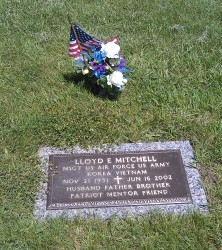When A Non-Leader Is A Leader
Posted by Mitch Mitchell on May 27, 2013
This past Saturday I went to visit my mother and we took a trip out to the cemetery where my dad and grandmother are. My dad was a veteran of two wars, and even though he wasn't killed in war he gave more than 2 decades of his life to the service and that says enough in my opinion.
 |
Often when I go I just hang around Dad's spot or walk in the area where some of what you see here is sitting. It's a very calming place that, if it weren't a cemetery, would be a perfect place to relax in. On this particular day I decided to walk around to take a look at some of the other people interred in this area.
Dad and my grandmother are in an area where tribute is given to military personnel and their family members. As you can see in the one image, my dad's highest rank is listed on the plaque. While walking around, I could see the ranks of the people who were there. Some were officers, some were non-commissioned officers like dad. It seems that in a cemetery it doesn't matter what someone's rank was; if you were in the military and were given an honorable discharge, you belong.
It's funny that when we think of leadership most of the time we think of the position or title a person has rather than what it is they do. That's easy to do; heavy lies the head that wears the crown. Still, even in the military, the police force, schools, there are different degrees of leadership depending on what's being done at that moment.
For instance, when I was the director of patient accounting in a hospital, which to most people is billing, my position reported to the chief financial officer. While he was the de facto leader, truth be told if I wasn't there and someone in my department needed a question answered, he wasn't the one who could give them one. If I wasn't available the CFO would either have to tell the person they would have to wait for me to be available again or would have to ask one of my supervisors for help. Even with the title, if you don't know anything about the subject what good are you in all instances?
 |
I thought about this while walking around the cemetery. There were a lot of PFCs (private first class) in there, and these are folks with literally no rank other than they got out of boot camp. Thing is, often these young men and women would have to assume the leadership role if no one else was around to make a decision. When it's a life and death situation, you either make a decision or risk getting killed, and it's often not only about you.
It's for reasons like this that I believe everyone should have a dose of leadership training in their lives. The military actually believes this as well; they don't often say they're training soldiers, they say they're training potential leaders. Even if everyone won't end up in the top job, no matter whether they stay in the military or go on to do something else, the military is often confident that they're teaching people how to make decisions when needed; that's one of the biggest leadership skills any person can learn.
Are you giving your non-leaders skills that help them make decisions, ergo possibly putting them on a leadership path? Something to think about.


I am not sure about leadership in the army, but certainly there is always mutual respect and team work. I’ve mentioned something in my previous comments about one of unwritten rules in the army – “it doesn’t matter, if you commander hates you, it is more important your unit team to respect you.” However, there is high doze of leadership and more importantly, sense for responsibility for other team members and of course civilians.
Carl, this is one of those posts where you have to expand your mind a bit. Within the military those of lower rank might not be leaders per se. But all are taught leadership skills because if something happened and a private was left with a group of civilians in a dire situation, the private would ultimately become the leader of the group if he or she had the proper training. That’s what training will do for you; that’s what I meant by this because it extends outside of the military as well in certain situations.
From first hand I can tell you that things doesn’t stay this way. Usually orders are few times overwritten until reach a private and at the end private follows only orders and instructions. It isn’t a “real” leadership but loyal following. More important is the mutual respect between lower rank soldiers, senior commanders and civilians in any situation. I doubt that majority of civilians would recognize ranks at all in dire situation, but at the end ranking is irrelevant.
I feel like you’re missing my point Carl so I want to try again. I’m not saying that someone in a lower position will be a leader for ever while in that position. What I’m saying is that something could happen and even a person in a low-level position can step into being the leader for short period of time before reverting back to what they were before. I’m also saying that someone can get leadership training without being a leader at that moment, but that training can lead them to be better leaders in the future when they’re doing something else. Everybody doesn’t learn this lesson, but a lot of people do.